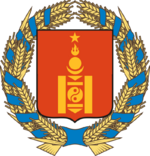Education in Gabrielland
 | |
| Gabrielt and Arsyan People's National Board for the Purposes of the People's Enlightenment | |
|---|---|
| Coordinator | Prof. Knīez Thnakhmā |
| National education budget (2020-2021) | |
| Budget | ɢ2.82 Trillion |
| General details | |
| Primary languages | Gabrielt languages, Arsyan languages |
| System type | Curriculum |
| Literacy (2019) | |
| Total | 97.9% |
| Male | 98.2% |
| Female | 96.6% |
| Primary | 99.4% |
| Secondary | 95.7% |
| Post secondary | 52.8% |
| Attainment (2020) | |
| Secondary diploma | 74% |
| Post-secondary diploma | 21% |
Education in Gabrielland falls under the jurisdiction of each individual province's educational board or department, however are coordinated at a regional level with the regional education advisory board, at a realm level, and at the national level with the Gabrielt and Arsyan People's National Board for the Purposes of the People's Enlightenment through a system of educational decentralization and deconcentration. Since 2002, it has been mandatory for all citizens to undertake twelve years of compulsory education, which consist of five years of elementary school, two years of middle school, and five years of high school, with various categories or types of schools within each stage. Jurisdiction over religious-based schools have been transferred from the National Board for Religious Affairs since 2005. Students are able to pick between government-run non-sectarian public schools, government-run religiously affiliated schools, or private schools.
Collectively, the government spends around 4% of GDP, roughly equal to more than 2.8 Trillion Gabrielt Gabiros for the academic year of 2020-2021, subsidising the majority of public-funded schools as well as some programs and facilities in private schools. This is done through a complex system of educational decentralization and deconcentation wherein each individual province possesses the powers to allocate the regional budget however one sees fit, although with constraints and mandatory obligations from either the regional, realm, or national level through series of legislation. Subsequently, education in Gabrielland as a whole is more unequal than in various other countries. As an example, in the entirety of the Arsyan realms, education is free and mandatory for all until at least an associate's degree since 2014, however, in the Gabrielt Kingdom or in the New Frontier, only some regions or provinces provide free educational services and facilities. The confederate nature of the nation as a whole prevents national legislation which would burden one party by a wide margin, as the poorer yet more populated Gabrielt provinces and regions would suffer massive budget deficits if education were to be made free.
The system as a whole is conducted using a curriculum system with set goals and objectives agreed at a national level, with very much leeway and flexibility for individual provinces or regions to contribute, modify, or suit to their personal needs. Some regions even have a standardized curriculum for that region agreed upon by all the provincial educational authorities responsible, with the first region to do so being the East Arsya Region in 2010 when the 2010 East Arsyan curriculum was revealed and first implemented. The current "national curriculum" of 2014 only facilitates the bare minimums and standardizations in respect to how long each phase should be, mandatory subjects, as well as the types of schools available to parents and students. Although differing in set standards and objectives measured in each different curriculum, diplomas from all accredited institutions must be accepted or be valid throughout the entire nation.
The language of instruction used in schools in Gabrielland differs according to the curriculum used, and consequently according to where a school or institution is located in. While the teaching and use of Standard Gabrielt is mandated and even encouraged, individual regions or schools have the freedom to teach in whatever language is proper or appropriate, with the vast majority of curriculums and subsequently schools mandating that teachers teach using the local language, with Standard Gabrielt reserved only for lessons regarding the language itself, or other mandated subjects. As an example, all schools in the capital Vailhims use Standard Gabrielt as a medium of instruction, while all schools in Sangur use standard Arsyan. This policy has led to the revival of some local languages and a surge in active and fluent speakers.